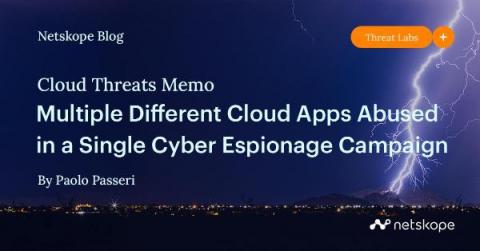Security | Threat Detection | Cyberattacks | DevSecOps | Compliance
Technology
Wallarm Platform Demo: API Leaks Management
Wallarm Platform Demo: Using the Settings Menu
Cloud Threats Memo: Multiple Different Cloud Apps Abused in a Single Cyber Espionage Campaign
Threat actors continue to exploit cloud services for cyber espionage, and a new campaign by a threat cluster named WIP26, discovered recently by researchers at Sentinel One in collaboration with QGroup, targeting telecommunication providers in the Middle East, confirms this trend.
Securing Your Amazon S3 Buckets
Amazon Web Services (AWS) is the world’s largest cloud provider, with well over a million active users. The popularity of AWS makes it one of the biggest targets for cybercriminals — and one of the leading contributors to breaches is incorrectly configured Amazon S3 buckets. For example, an insecure bucket led to the unauthorized access of 23 million documents and 6.5 TB of data belonging to Pegasus Airlines.
API Security 101: Understanding the Risks and Implementing Best Practices
Being with the "best of the best" as a YC Top Company
Salt has long benefited from the unique support that comes from being part of the Y Combinator accelerator program (Salt was in the Winter 2016 batch), and all these years later, we’re thrilled to have been named to not one but two of YC’s Top Company lists – the Top Private YC companies 2023 and the YC Breakthrough Companies 2023. For the Top Private list, it’s deja vu all over again, since we made that list last year as well.
Using ChatGPT to Improve Your Cybersecurity Posture
On November 30, 2022, ChatGPT quaked the digital world, sending a tremor that even rattled the cybersecurity industry. Instead of responding in panic, a more sensible approach is to begin learning how to leverage the technology to streamline your workflow and optimize your skills. In this post, we explain how ChatGPT can be used to improve your cybersecurity posture and data breach resilience.
Traveling with OAuth - Account Takeover on Booking.com
OAuth (Open Authorization) is a modern, open authorization standard designed to allow cross-application access delegation – for example, allowing your application to read data from your Facebook profile. Combined with the proper extensions, OAuth can also be used for authentication – for example, to log into your application using Google credentials. Since its first introduction in 2006, OAuth has gained tremendous popularity.











